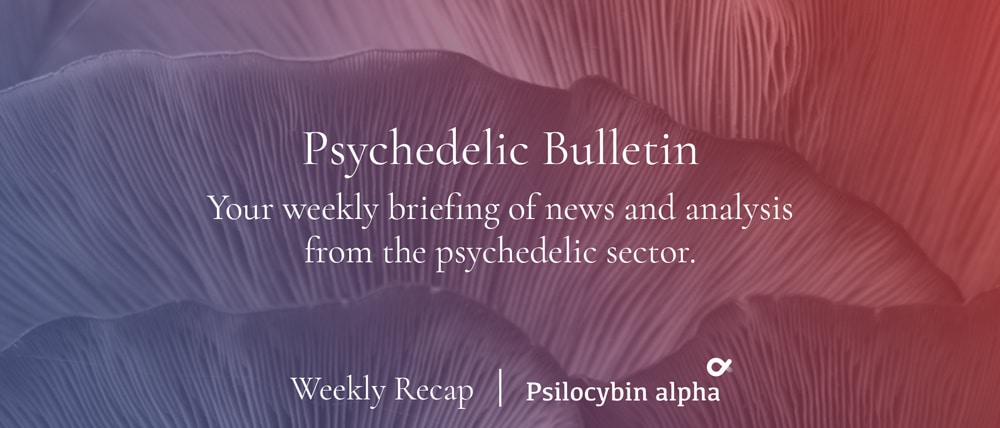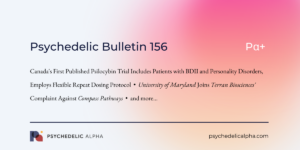This week’s bulletin is much shorter than usual, largely owing to the fact that we published the second section of our Psychedelics 2021: A Year in Review series this week. Scroll down to the Weekend Reads segment to read the blurb and access the report on Psychedelic Research and Clinical Trials in 2021.
Psychedelic Sector News
MindMed Cofounder Stephen Hurst Resigns from Board
Shortly after we sent our bulletin last Friday, MindMed announced the resignation of co-founder and Board member (and, former co-CEO) Stephen Hurst.
Hurst made a significant contribution to MindMed’s 18-MC program, which was acquired from Savant HWP, which Hurst co-founded and served as CEO.
Other Company News
- atai announces FDA IND clearance for PCN-101 R-ketamine program;
- Awakn announces positive results from Phase II A/B ketamine-assisted therapy for alcohol use disorder trial;
- Cybin announces IRB approval for sponsored study using Kernel Flow tech to measure psychedelic effects on the brain;
- Field Trip receives notice of allowance for S. patent covering FT-104;
- Mydecine engages marketing provider; shares details of AI modelling project;
- MYND announces Collaborative Research Agreement with UBC;
- Numinus submits clinical trial application for Phase 1 trial on proprietary psilocybin product;
- PharmaTher announces FDA approval of IND application for ketamine to treat ALS;
- Wesana granted FDA pre-IND meeting; provides strategic and operational updates.
Weekend Reading
Event Next Week: All That You Ever Wanted To Know About Psychedelic Patents and IP
Psilocybin Alpha Editor-at-Large Graham Pechenik appears alongside Chris Byrnes and Azadeh Momenghalibaf to answer your questions about psychedelic patents and IP, in an event hosted by Chacruna.
Azadeh Momenghalibaf spoke at Horizons NYC in December on the topic of patents in a talk titled Public Health and Psychedelic Medicine. Pechenik also spoke on patents earlier in the Saturday session. Both talks sparked a great deal of conversation and healthy debate about the role of IP in the psychedelics space.
Join a discussion and ask-me-anything (AMA) forum with IP attorneys Graham Pechenik and Chris Byrnes. The discussion will address the legal and economic rationales for the existence of different types of IP, provide an overview of innovative uses of IP in the psychedelics market, and contemplate the ways in which web3 technology can be used to create a psychedelic IP commons. Along the way, we’ll invite questions from attendees and endeavor to answer all that you ever wanted to know about psychedelic patents and IP.
Wednesday, January 19th, 2022 from 12:00-1:30pm PST | Further information here.
Global Coalition to Reschedule Psilocybin Emerges
A new global coalition announced a new campaign on Tuesday to get psilocybin mushrooms internationally rescheduled.
As the psychedelics reform movement continues to expand domestically in the U.S., the International Therapeutic Psilocybin Rescheduling Initiative (ITPRI) is seeking a worldwide policy change in order to facilitate research into the therapeutic potential of the substance.
Partners of the coalition include the Multidisciplinary Association for Psychedelic Studies (MAPS), Beckley Foundation, Mind Medicine Australia, Drug Science and Open Foundation.
The initiative focuses on international drug scheduling under the United Nations’ 1971 Convention on Psychotropic Substances, which currently places psilocybin in the most tightly restricted, Schedule I category, which is supposed to be reserved for drugs that constitute “an especially serious risk” and have “limited” therapeutic uses.
Advocates say that psilocybin fits neither of those criteria.
Learn more about the Initiative via the ITPRI website.
Now Live: Psychedelic Research and Clinical Trials in 2021
The second section of our Year in Review, Psychedelic Research and Clinical Trials in 2021, is now available to read.
At around 10,000 words, it’s the lengthiest section by far: testament to the quantity and quality of psychedelic research and trials conducted this year.
The resurgence of research into psychedelics has continued to thrive over the past year. Dozens of trials and hundreds of studies have been published in 2021, expanding the depth and scope of scientific inquiry in this flourishing space.
If published findings from this past year are a reliable indicator of what is to come, these investigations will foreseeably expand our fundamental understanding of psychedelics and point to new, promising avenues of exploration.
However, we must also appreciate the methodological challenges inherent in psychedelic research, as well as the broader fields within which such research is nested.
It’s worth reminding ourselves of the lengthy timescales involved in drug development, with clinical trials regularly taking in excess of six years to complete. As such, it’s worth looking at studies announced and approved in 2021, and considering when we may expect to see data readouts from such work.
Just as the funding environment for psychedelic research has heated up significantly in recent years, regulators are also demonstrating an increasingly warm attitude to such work. Toward the end of this section we review some key regulatory developments in 2021, and profile a handful of new psychedelics research centres.
As you will see as you leaf through this report, psychedelic research is showing no signs of slowing. One of the most prolific psychedelics researchers, Robin Carhart-Harris, predicts “more of the same” in 2022, and data confirms that we’re witnessing the most productive period of psychedelic research (at least that which is conducted in recognised institutions).
Weekly Bulletins
Join our newsletter to have our Weekly Bulletin delivered to your inbox every Friday evening. We summarise the week’s most important developments and share our Weekend Reading suggestions.
Live Updates
Join us on Twitter for the latest news and analysis.
Other Channels
You can also find us on LinkedIn, Instragram, and Facebook.






